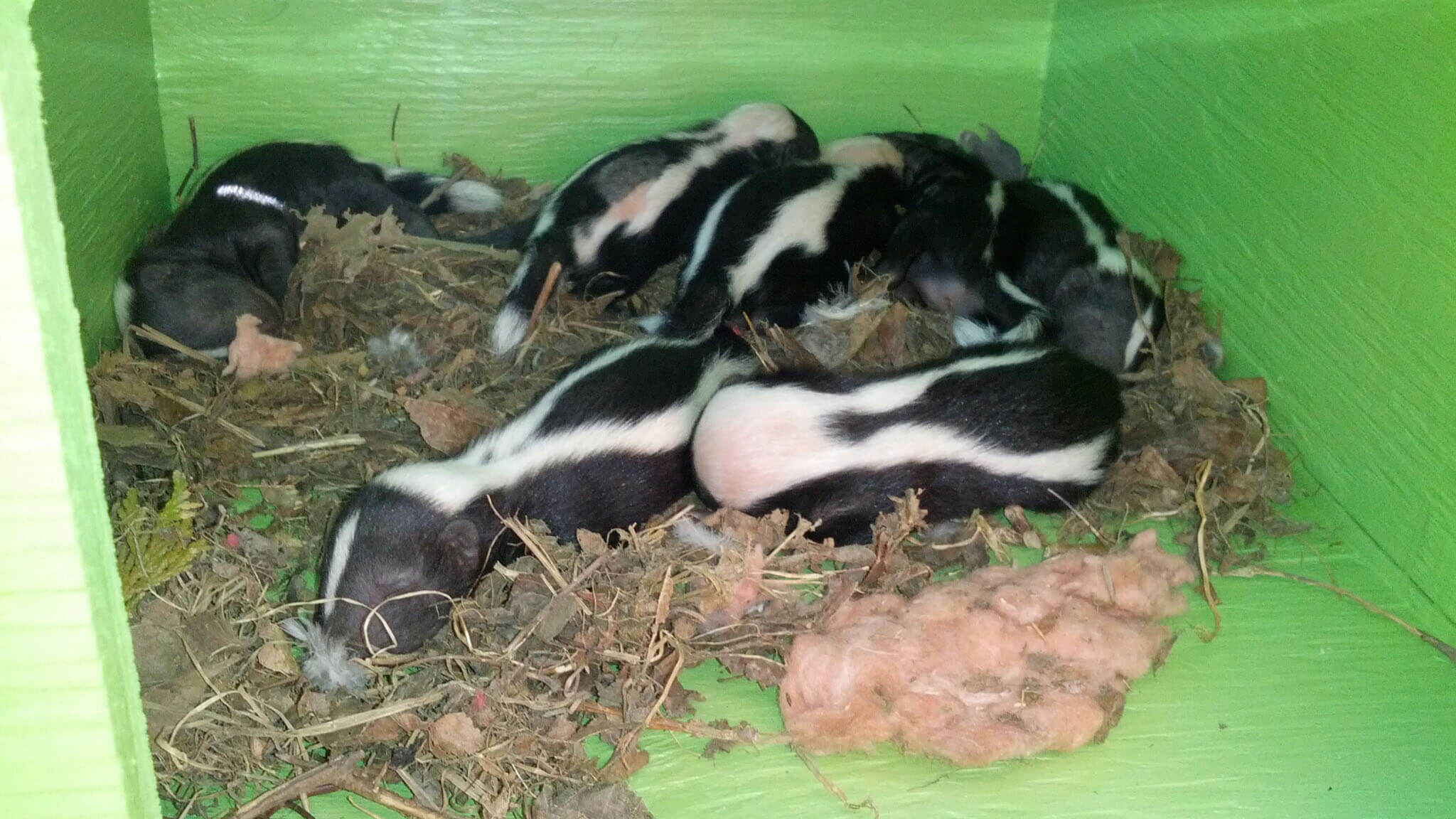SKUNK REMOVAL PROCESS
Assess and Remove
To solve a skunk problem, we start with a complete assessment of your property to determine where the skunks are living and how they’re gaining access. Since skunks do not climb our inspection will focus on the ground level den sites like porches, decks and sheds. We then perform a careful and humane removal, including any babies.
Clear and Clean
Once we humanely remove any skunks and their babies we will move on to clearing the den site of any damaged property, nesting material or debris that was gathered by the animals. We can then begin cleaning, disinfecting and deodorizing the area to eliminate any risk of illness, irritating odors and attractants for other wildlife.
Prevent and Protect
To prevent a future skunk problem, our technicians will get to work installing protective barriers designed to keep skunks out. This usually involves digging out around the perimeter of the deck, shed or porch and burying a heavy steel mesh deep into the ground. Our workmanship and materials are backed by a lifetime warranty.
Reviews From Our Toronto Residents
Skunks in Toronto
Skunks are easily recognizable with their dark black fur and white stripe. The striped skunk that you see in our area typically has a solid white stripe that starts at the head and then diverges into two stripes across the back, though variations in this pattern are not unusual. Skunks are not aggressive. They don’t need to be. Their pungent spray is enough to keep humans and would-be predators at bay. As such, the skunk has very few predators in the wild. Their odour is enough reason to want to evict a skunk houseguest. This is a task best left to skunk removal professionals in Toronto!
Our smelly friends are keen on laying low over the cold winter months. After beefing up in the fall, they take to their dens to cozy up and keep warm. In the warmer months, skunks prefer the solo life, except for mothers and their young. When the weather turns colder, however, they bend the rules a bit and share their dens for the added heat extra bodies provide. Even males are tolerant of one another’s presence. Once spring hits, they will all head their separate ways again.
Skunks sleep away the days in a state of torpor. This is similar to hibernation, but the cycle of slumber is shorter. Sleeping helps to conserve precious energy, as the body temperature drops, heart rate slows and metabolism decreases. This lowers the number of calories needed to survive. If the weather warms up, skunks may wake up and head out of their dens to seek out additional food sources. While their claws are made for digging, skunks will gladly take advantage of the abandoned dens of other animals.
Skunk Facts
Skunks may take up residence under porches or decks, or they might take advantage of barns, garages or crawl spaces for their dens. Though they pose little danger, unless one has rabies, their stench is difficult to live with. Removing them from their living quarters is not easy, and the task becomes trickier if kits are involved. Humane wildlife control for skunks with kits involves extra care to ensure mothers and babies are reunited.
FACT:
There are 12 species of skunk, and all of them have some variation of striped patterns on their bodies. The only species in our area is the striped skunk, and the only other Canadian species is the western spotted skunk, which can be found in British Columbia.
FACT:
Mama skunks are highly protective of their offspring. Though these animals are shy and skittish most of the time, a mother may turn aggressive if she feels that you pose a threat to her babies.
FACT:
The reason a skunk’s spray smells so bad is due to a chemical component of sulphur called thiols. Anyone who has had their pet sprayed knows just how difficult it is to get rid of the stench.
FACT:
After mating female skunks immediately shun the male and spends her entire pregnancy and motherhood as a single parent.
FACT:
If you think you smell skunks more frequently in spring, you are probably right. Females rebuff unwanted male partners by spraying. It just goes to show you that even skunks can’t handle their odour!
CHECK OUT OUR LATEST BLOGS
Prince George‘s Wildlife Control: Why the Skunk Can be a Gardener’s Best Friend
Why DIY Can’t Keep Skunks Out This Summer?
Effective Tips to Get Rid of Skunks and Neutralize Smell if Sprayed
3 Reasons Why Professional Skunk Removal is Important
Learn About Skunk Babies and When They Leave the Den






